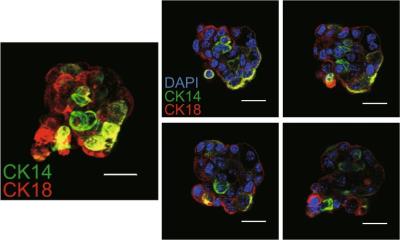
Source: Pixabay/xusenru/OpenClipartVectors
News • Nanoparticle therapy
Putting a target on breast cancer
The complex structure of breast tumours makes treatment a medical challenge. A promising, novel selenium-based breast cancer nanoparticle therapy could change that.
It has proved to boost the active agent delivery and assure it's active only in the target tissue while also bringing the suggestion of reduced side effects. The project findings are expected to increase the efficiency of future chemotherapies and prevent recurrence of the cancer after complete remission.
The European Chronic Disease Alliance defines cancer as the biggest non-communicable illness of our time causing 13% of global deaths. Breast cancer is the most common type of cancer; it accounts for more than 10.4% of all cancer in women and causes approximately 400.000 deaths per year globally. Various approaches and substances have proven to be effective, among others selenium, a trace element that is an essential for human nutrition. Due to its mechanism of action, selenium inhibits and/or reduces the progression of the disease and activates the body's immune system and defence cells.
"Selenium is usually given in the form of dietary supplements in the concomitant treatment in addition to chemotherapy or radiation", says Alexandra Herrero-Rollet. Together with her colleague Doris Ribitsch, the scientist of the Austrian Centre of Industrial Biotechnology (acib) in Tulln (Lower Austria), is using selenium not only to prevent or treat unwanted side effects of cancer therapies, but now for the first time also as a tumour therapy it its own right: In the Neosetac project, a consortium of five EU partners from industry and academy is developing a new selenium-based nanoparticle therapy for breast cancer.
Recommended article

News • Women's health
Breast cancer treatment has evolved. Here’s where we are.
There is no “one size fits all approach” when it comes to treating breast cancer. The disease is made up of several subtypes, and ideally each type should be treated with therapies that target the unique underlying biological problems. Fortunately, for the past 25 years, long-term survival and cure rates have significantly improved for women with breast cancer. This is due in large part to…
Improved effect and delivery
To date, the use and the related effect of selenium compounds has been limited for several reasons including the relatively short half-life in the human body, the complex chemical structure that need special formulation for drug delivery, and because of the need for precise dosage, as high doses of selenium have a toxic effect and may entail undesired side effects. A very promising concept for improving the delivery of the drug and enhancing its effect within the narrow therapeutic window of cancer therapies has now been generated: The scientists designed bio-degradable nanoparticles (NPs) containing selenium to enhance the therapeutically efficacy.
Nanoparticles for targeted tumour therapy
The concrete example of Neosetac showed that human serum albumin can be a suitable material for the production of nanocapsules in the future
Doris Ribitsch
To keep the selenium compound stable during transport, the biotechnologists coat the active substance with tiny biological capsules, also referred to as nanocapsules. By means of this method – first employed by Patrick Couvreur, a scientist from Paris, in 1979 – the drug is gradually released via the body’s metabolic cycle, ensuring a more precise effect. "The concrete example of Neosetac showed that human serum albumin can be a suitable material for the production of nanocapsules in the future", Ribitsch explains. The concentration of this protein found in blood is significantly reduced in breast cancer patients, especially in the malignant tissue. To achieve a protein balance, the body transports the introduced serum protein to the tissue via osmotic pressure.
Active drug targeting
The scientists use active drug targeting to ensure that the selenium compounds act only in the tumour lesions or metastases and not in the healthy tissue: Using enzymes and biotechnological methods, the Human serum albumin-nanocapsules are "equipped" with antibodies through covalent bonding. As modern biomarkers they transport drugs via the blood only to the desired target tissue where they bond with the proteins on the tumour cells and initiate apoptosis (cellular death).
Therapy success increased, side effects reduced
With the new, selenium-based nanoparticle therapy method, the experts expect more successful therapies, better tolerance of drugs and a significant reduction in side effects. The research findings are anticipated to increase the efficiency of future chemotherapies and prevent recurrence after complete remission. In the following years, Neosetac's objective is to transfer the initial promising results obtained with two powerful compounds from the production phase to the clinical trial phase.
Source: Austrian Centre of Industrial Biotechnology (acib)
29.10.2018











